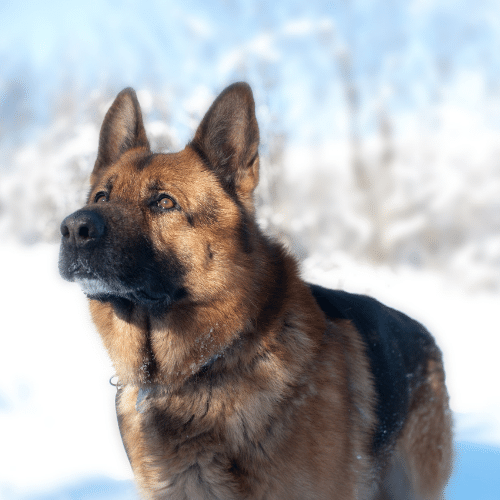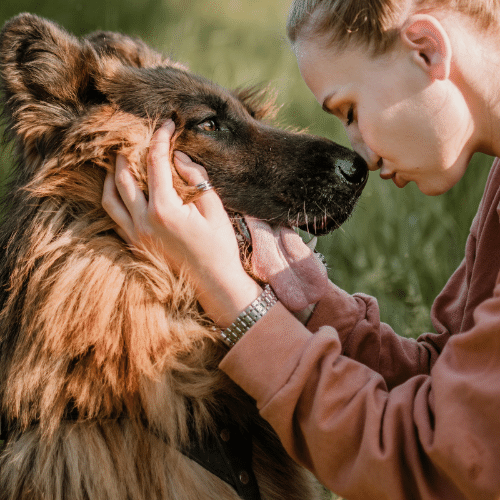Are German Shepherds Dangerous?
December 30, 2021 2021-12-30 6:28German Shepherds were originally bred as protection animals. Therefore, they have protective and territorial instincts that other dogs may not have. A tiny Shih Tzu does not have the same protective instincts that a German Shepherd has – that’s plain and simple.
However, that doesn’t necessarily mean that German Shepherds are dangerous. There are a lot of mixed opinions about this topic – as well as a lot of mixed science that seems to back up both sides.
Most aggressive German Shepherds are aggressive because of their owners. German Shepherds need to be socialized and trained so that their territorial instincts can be harnessed. Otherwise, they may become territorial towards individuals that you don’t want them to, like family friends.
To accept individuals into their homes, German Shepherds need to be taught that not everyone is bad.
If owners perform this responsibility, then their dogs typically aren’t dangerous. In fact, these dogs can be extremely gentle when raised properly.
However, not everyone who owns a German Shepherd is responsible. In some cases, owners may adopt a German Shepherd because they are “cool” or because they believe they’re getting a ready-made guard dog. Without the proper knowledge, these dogs may not get the socialization they need to thrive.
On the other hand, other owners know perfectly well what the German Shepherd needs – but find it more difficult to provide for those needs than they originally expected. In these cases, the German Shepherd’s socialization tends to level out as they become older. They may get the care they need as adults but then be mostly kept to themselves as puppies.
Table of Contents

The Science Behind German Shepherd Aggression
There are many opinions about whether or not German Shepherds are more aggressive than other breeds. But let’s look at what the science says on this topic.
The American Veterinary Medical Association ran a whole study on whether or not particular dog breeds were more likely to be aggressive than others.
They found that the highest prevalence of bites fell on a few breeds – namely the German Shepherd, Pit Bull, Rottweiler, Jack Russell Terrier, Chow Chows, and a few others. However, it is essential to realize that these breeds are also more common in the United States. When you have more German Shepherds out there than other breeds, you’re going to end up with more German Shepherd bites.
In Canada, most dog bites are attributes to Siberian Huskies and other sled dogs – likely because these are the most common breeds there.
Similarly, in Rome, Italy, Mastiffs were found to have the highest bite occurrence. However, they are also one of the most popular dogs in that area.
Furthermore, the popularity of different breeds coincided with bite reports. The more popular a breed was, the higher that bite statistic rose. Therefore, bite statistics don’t seem to actually tell us what breeds are more dangerous than others. It seems to be largely associated with the popularity of the breed, not their actual aggression levels.
Based on behavioral assessments, small breeds seem to be the most aggressive – not larger breeds like the German Shepherd. However, these bites are largely underreported because they do not usually require treatment.
Bites on children statistically come from small breed dogs, like Chihuahua and Lhasa Apsos. The statistical difference in bites reported between children and adults likely comes from the fact that children need treatment after a small breed bite, while adults do not.
The behavioral assessments for German Shepherds are mixed. This suggests that there is likely high variability within the breed. Some German Shepherds are much more likely to be aggressive than others, in other words.
Again, socialization and training play a large role in this. Adopting your dog from a qualified breeder is also important. After all, genetics do play a role as well.

Will German Shepherds Attack Their Owners?
There is no evidence that German Shepherds are more likely to bite their owner than any other breed. Like all dogs, German Shepherds will protect themselves if threatened. If an owner is too rough with a German Shepherd, they may try to defend themselves by biting.
This trait can be said for all breeds, though. No dog is going to submit to injury if they feel like they can defend themselves.
Again, we highly recommend socializing this breed at a young age. Most bites are caused by fear, including those directed at people. Unless you are purposefully scaring your dog by “over disciplining,” then the chance of a bite is extremely rare.
However, if they do bite you, it’s likely because you did something scary – whether or not that thing was actually scary to us. For instance, dogs are commonly afraid of umbrellas. That’s why they are used during temperament tests.
Socialization is essential to prevent your dog from becoming scared of things like umbrellas, which may cause them to “protect” themselves from the menace. If you happen to be the one holding the umbrella, this isn’t going to be very good for you.
At the same time, you should also familiarize yourself with proper dog training. German Shepherds need training, but it’s important that the training is backed by science. Positive reinforcement training works best, as there is a very small chance that the dog is going to react negatively to treats. You don’t want to teach your dog to be scared of you.
After all, dogs bite things they are scared of!
Dominance training has been disproven for dozens of years. Not even wolves display “dominance” behavior as most people think of it. It can also make your dog react negatively, causing your dog to bite.
Are German Shepherds Naturally Aggressive?
It depends on what you mean by “aggressive.” These dogs are naturally territorial and protective. They were bred to protect herds of sheep and were then utilized for military and police work. Their protective instincts are still with them today, as they are commonly still used as guard and protection dogs.
Therefore, these dogs aren’t going to be as friendly with strangers as other breeds. They are not Labrador retrievers in the least!
However, that doesn’t necessarily make them aggressive either. They are very calm family dogs in most cases, especially if they are socialized from a young age.
They are not particularly more likely to bite than other breeds when properly socialized and trained. There is a lot of variation amongst German Shepherds, though. Some are more likely to bite than others. Much of this depends on the training, though genetics can play a role as well.
If you purchase a German Shepherd as a puppy, we highly recommend purchasing them from a quality breeder. These breeders are likely to pay more attention to their dogs’ temperaments. Breeders are not going to breed a dog if they are overly aggressive and untrainable. Backyard breeders and puppy mills typically don’t pay attention to these things!
At What Age Does a German Shepherd Start Guarding?
That’s not exactly how this works. There isn’t an age that your German Shepherd will suddenly decide that they need to guard the house. Dogs are born with innate instincts and behaviors – including territorial behaviors.
All German Shepherds will display territorial behaviors from their birth. These are innate instincts. A little German Shepherd puppy is going to be at least somewhat wary of strangers. They probably won’t be as friendly or cuddly as other breeds – that simply isn’t how they work.
However, that doesn’t mean that a tiny puppy can guard your house, of course. A small puppy isn’t going to do much against a home invader. That doesn’t necessarily mean that they won’t try, though.
It will likely take a least a year for a German Shepherd to get large enough to actually be intimidating. Before this time, these dogs will likely be too small and puppylike.

However, it can take up to two years before a puppy is full-grown. You likely shouldn’t plan on them guarding anything until they are at least close to being fully grown.
The instincts will be there from birth, though. They don’t just kick on someday.
Still, many dogs will become more territorial around puberty, though this isn’t always the case.
Why Are German Shepherds Not Good Pets?
German Shepherds can be great pets – for the right family. However, there are many cases when they can make very poor pets.
Here are some of the reasons you don’t want a German Shepherd:
- You don’t want to deal with training. German Shepherd dogs require significant amounts of training. Not only do they need to be taught how to behave, but these dogs are also extremely intelligent. If their brains aren’t kept stimulated, they will become destructive in an attempt to make their own fun. Therefore, you should continue to train them even after they have mastered all the basic commands.
- You don’t want to search for a good breeder. You should seek out a qualified breeder for any dog you’re planning on purchasing. However, it is particularly important for German Shepherds. Sadly, good breeders can be difficult to come by. These dogs are quite popular, so there are lots of breeders out there. However, that doesn’t necessarily mean that they all follow strict breeding guidelines.
- You don’t want the possibility of health issues. Many people mistakenly believe that purebred dogs are healthier than mixed breeds. However, the opposite is true. Purebred dogs are prone to a variety of genetic conditions, including the German Shepherd. Hip dysplasia and a wide variety of other conditions are common in this breed. They can happen to any canine, so don’t adopt a German Shepherd if you don’t want to pay potentially thousands of dollars in vet bills.
- You don’t want to spend hours grooming. German Shepherds shed a lot. They require daily brushing in some cases. At the very least, you’ll need to brush them a few times a week. If you can’t make this commitment, you shouldn’t adopt a German Shepherd.
- You aren’t willing to pass on potentially at-fault dogs. There are many cases when you shouldn’t adopt a German Shepherd puppy. If you adopt the first puppy you see, you probably aren’t going to end up with a dog that has a sound temperament. You should only adopt from a breeder that puts temperament at the forefront. Otherwise, you may end up with an aggressive dog that guards resources and can’t tolerate children.
- You don’t want to spend time socializing. You need to socialize German Shepherds a lot. If you don’t, they can easily become fearful and believe everyone is a threat to their territory. They need to be introduced to many different people so that they know that not everyone is a threat. You only want them protecting you and your family from bad people – not everyone.
- You don’t want to commit to them for 15 years. German Shepherds usually live between 10 to 14 years. However, 15 years is not unheard of. If you don’t want to commit to your dog for this amount of time, please don’t adopt on. You shouldn’t be considering getting rid of your dog when you move, have the next baby, or get married.
Final Thoughts
German Shepherds have the potential to be aggressive. Every dog does. However, with the correct socialization and training, these dogs can easily be trained to accept others into their territory. They will never be as friendly as your average Labrador retriever – but that isn’t the point of a German Shepherd.
However, these dogs are a big responsibility. You’ll need to commit to training and socializing them extensively. This isn’t a breed to get “just because.” You should expect to put in hours a week – aggressive German Shepherds often have owners that don’t.
Be sure to carefully consider whether or not you want a German Shepherd before you adopt one. Your actions will largely determine whether or not they become aggressive.

Author: Kristin
Kristin was born in Tennessee and currently lives there with her husband and children. She is passionate about educating pet parents and helping them make the best possible decisions for their pets. She currently owns one dog, two cats, a lizard, and a variety of fish.

